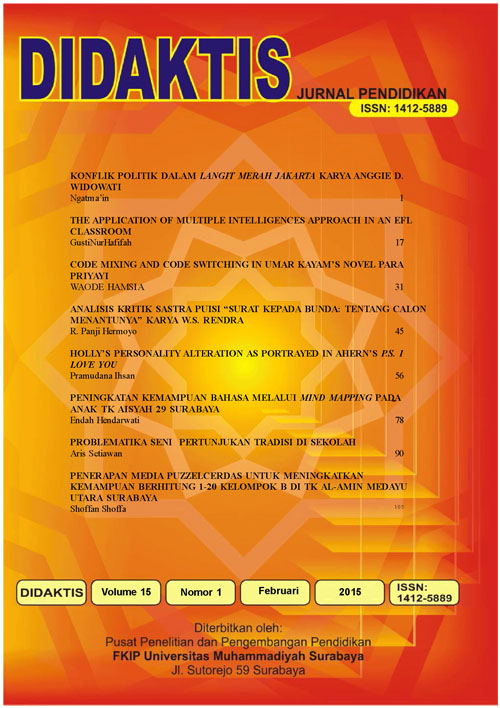Holly’s Personality Alteration as Portrayed in Ahern’s P.S. I Love You
Abstrak
Artikel teks lengkap
Referensi
Ahern, Cecelia. P.S. I Love You, Special Overseas Edition. London: HarperCollins: Publishing, Inc, 2007.
Allen, Bem P. Personality Theories – Development Growth and Diversity. Boston: Pearson Education, Inc, 2006.
Alwisol. Psikologi Kepribadian. Malang: UMM Press, 2002.
Cooper, D. Arthur. Sin, Pride, & Self-acceptance: The Problem of Identity in Theology and Psychology. Downers Grove, IL: InterVarsity Press, 2003.
Engler, Barbara. Personality Theories. Boston: Houghton Harcourt Publishing Company, 2009.
Feist, Jess and Gregory J. Feist. Theory of Personality, fifth edition. New York: The McGraw-Hill Companies, 2002.
Gerungan, W.A. Psikologi Sosial, cetakan kesebelas. Bandung: PT ERESCO, 1988.
Gill, Richard. Mastering English Literature. London: The MacMillan Press, 1985.
Guches, Richard C. A Hand book to a Critical Analysis of Literature. Palo Alto: Peek Publication, 1980.
Horney, Karen. Neurotic Personality of Our Time. Great Britain: Routledge 11. London, 1999.
Moesono, Anggadewi. Psikoanalisis dan Sastra. Depok: Pusat penelitian. Kemasyarakatan dan Budaya Lembaga Penelitian Universitas Indonesia, 2003
Robert, Edgar V. Writing Themes About Literature. Seventh Edition. New Jersey: Prentice-Hall, Inc, 1991.
Roberts, Edgar V and Henry E. Jacobs, Literature: An Introduction to Reading and Writing. Third Edition. New Jersey: Prentice-Hall, Inc, 1992.
Simpson, Erik. Connections – A Hypertext Resource for Literature. 2008. http://www.math.grinnell.edu/~simpsone/Connections/Fiction/Charac/index.html. Accessed on 12 December 2009.
Tourism, Dublin. Truly, Madly, Deeply Dublin. 2007. http://www.visitdublin.com/pdf/iWalk10.pdf. Accessed on 15 June 2010.
Tyson, Lois. Critical Theory Today: A User-Friendly Guide. London: Garland Publishing, Inc, 1999.
Wand, DC. Cecelia Ahern/a/. 2009. Rretrieved from http://www. fantastic-fiction.co.uk/a/cecelia-ahern/. Accessed on 23 September 2009.
Warren, Susan May. PS I Love You and the Art of Flashbacks. 2010. Retrieved from http://seriouslywrite.blogspot.com/2010/03/ps-i-love-you-and-art-of-flashbacks-by.html. Accessed on 15 June 2010.
Watson, George J. Irish Identity and the Literary Revival 2nd Edition. Washington DC: The Catholic University of America Press, 1994.
Wellek, Rene and Austin Warren. Theory of Literature. London: Penguin Books, 1979.
Widjajati, S.E. Study Questions to Help You Get the Most out of the Short Story. A Handout. English Department. Airlangga University. 26 March 2010.
Penulis
Hak cipta berada di tangan penulis
Artikel yang terbit dapat digunakan di bawah lisensi Creative Commons Attribution-NonCommercial 4.0 International License.


